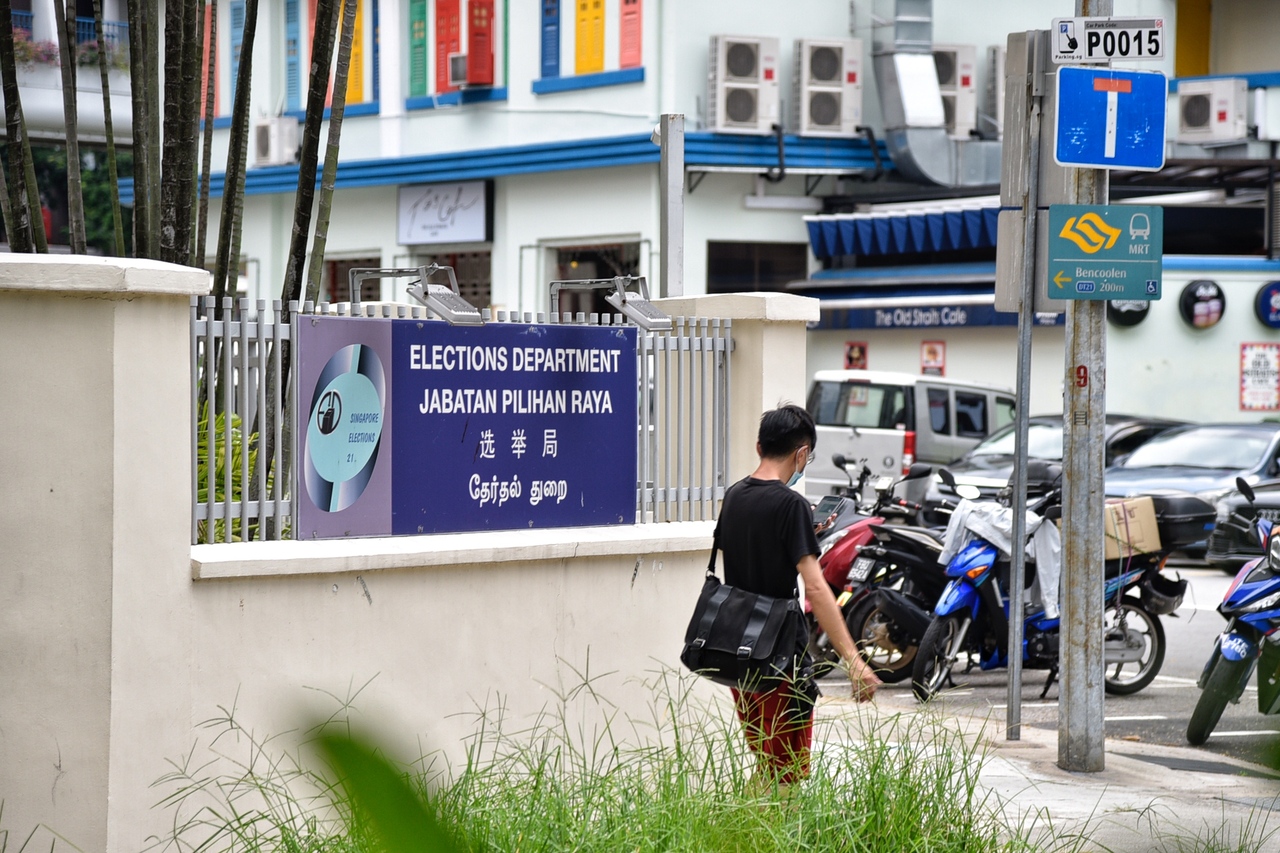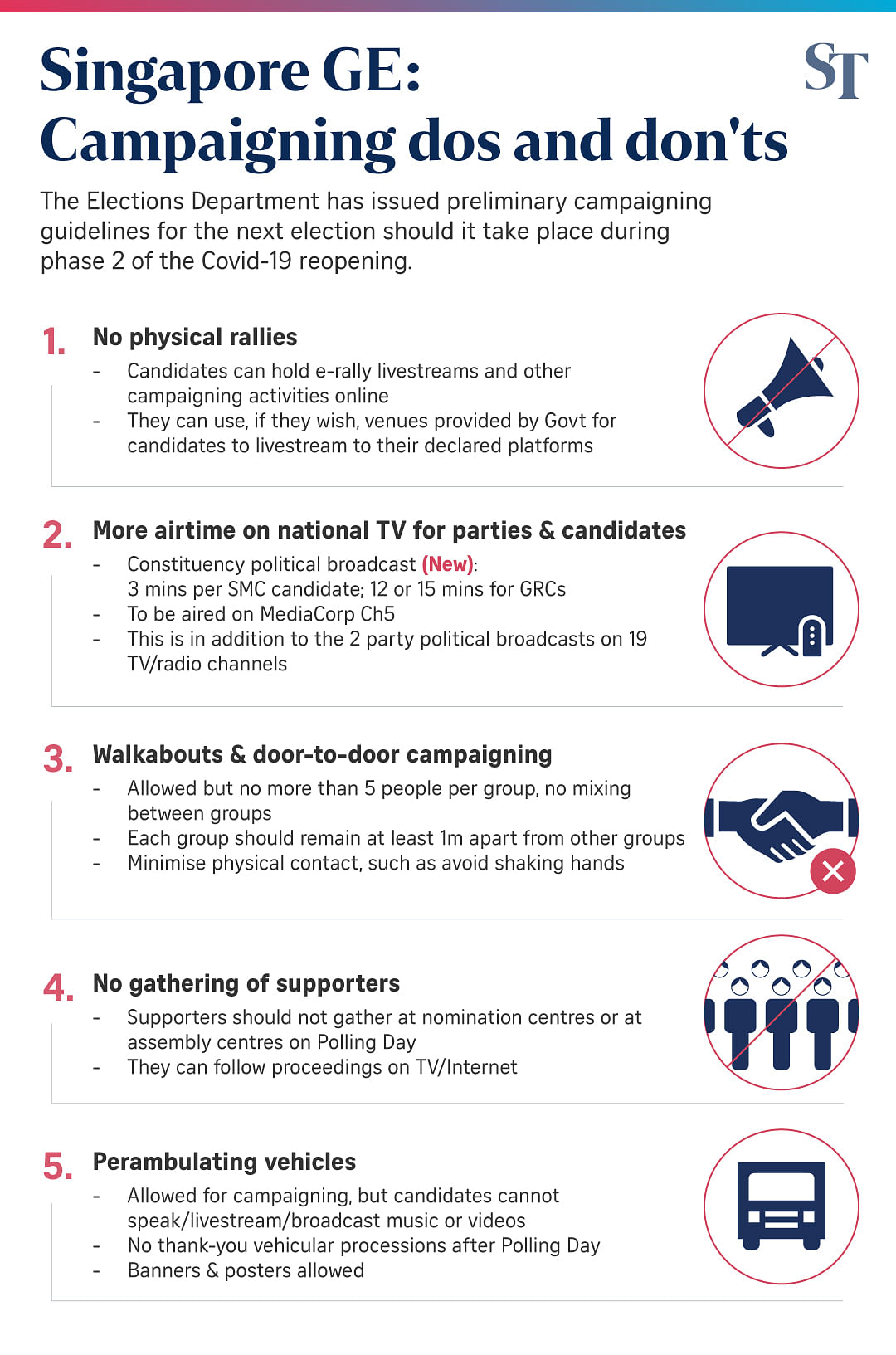Singapore GE: Opposition parties welcome more airtime but raise concerns about lack of physical rallies
Sign up now: Get ST's newsletters delivered to your inbox

New campaign guidelines were announced by the Elections Department on June 18, 2020.
ST PHOTO: DESMOND WEE
SINGAPORE - Opposition party leaders welcomed the increased airtime on national television for candidates, even as they raised concerns about the loss of in-person rallies.
Reacting to new campaign guidelines announced by the Elections Department for a general election that takes place during phase two of Singapore's reopening, opposition parties were mixed about the restrictions.
Many party leaders said the move to grant three minutes to every candidate was a good platform for them to increase the reach of their messages.
Mr Lim Tean, secretary-general of People's Voice, said: "I welcome the increased airtime for all the parties. That's very good. For SMC candidates to be given three minutes, that's excellent."
Similarly, People's Power Party chief Goh Meng Seng said it would shift the focus to the quality of each candidate, rather than the party branding.
"If you have more direct engagement from the candidates through the mass media to say their piece on national airways, it will actually make parties more serious in fielding their candidates. We now have to open our eyes and ears to vote, instead of being distracted by party branding during rallies," he said.
Mr Goh said the measures also level the playing field for smaller parties, and lower the barrier of entry due to the lower costs.
Mr Jose Raymond, chairman of the Singapore People's Party, similarly said it was good for parties to be given the time, though he wanted to know how the timing of broadcast would be decided: "I am interested to know how this will be scheduled given that we will have 93 seats up for elections, and about 200 candidates slated to take part."
The Elections Department (ELD) had said it will release more details about the constituency broadcast at a later date.
The Workers' Party, the largest opposition party here, said it is "currently studying the guidelines".
Other party leaders said the loss of physical rallies would disadvantage opposition parties.
The Singapore Democratic Party said that the moves "benefit the ruling party because the opposition cannot hold our traditional rallies, which are crucial opportunities to communicate directly with voters".
"Ground activities are also restricted to small groups, which will hamper effective outreach and communication," it added as it reiterated its call for the campaign period to be extended.
Similarly, Reform Party chairman Andy Zhu said that the lack of physical rallies removes some of the excitement of campaigns, with voters likely to be less fired up by online broadcasts.
"I don't mean to say that attendance in rallies brings in votes in exchange, but if there are no rallies, there there's no hype. Online or television broadcast, they might not be as enthusiastic and they can't shout and roar. The emotional aspect is important."
He said that the television airtime pales in comparison with a rally, where each candidate can speak for at least 30 minutes. However, he added that it may not be a totally bad thing as there are segments of the population who do not attend rallies anyway.
Mr Hamim Aliyas, secretary-general of the Democratic Progressive Party, also said that the airtime for political broadcast is insufficient for his party's outreach efforts during the campaign, and suggested that rallies continue with safe distancing measures in place.
"There must be rallies at the period of campaigning, with safe distancing at the open spaces or stadiums, so that the message of political parties will be heard by voters," he said.
In the meantime, it will use its online platforms like Facebook and interactions with the media, to share its stand on issues.

Red Dot United, Singapore's newest registered political party, said in a statement that rallies let voters gauge candidates up close, and let candidates engage voters more effectively with their party messages.
"There is also concern that older voters who are less digitally connected may miss the political parties' messages, which would largely be online," RDU said.
It also called for ELD to make it compulsory for the mainstream print media to announce the streaming times of online rallies of all parties during the election period, and to do a one-page spread of each party's manifesto and policies.


